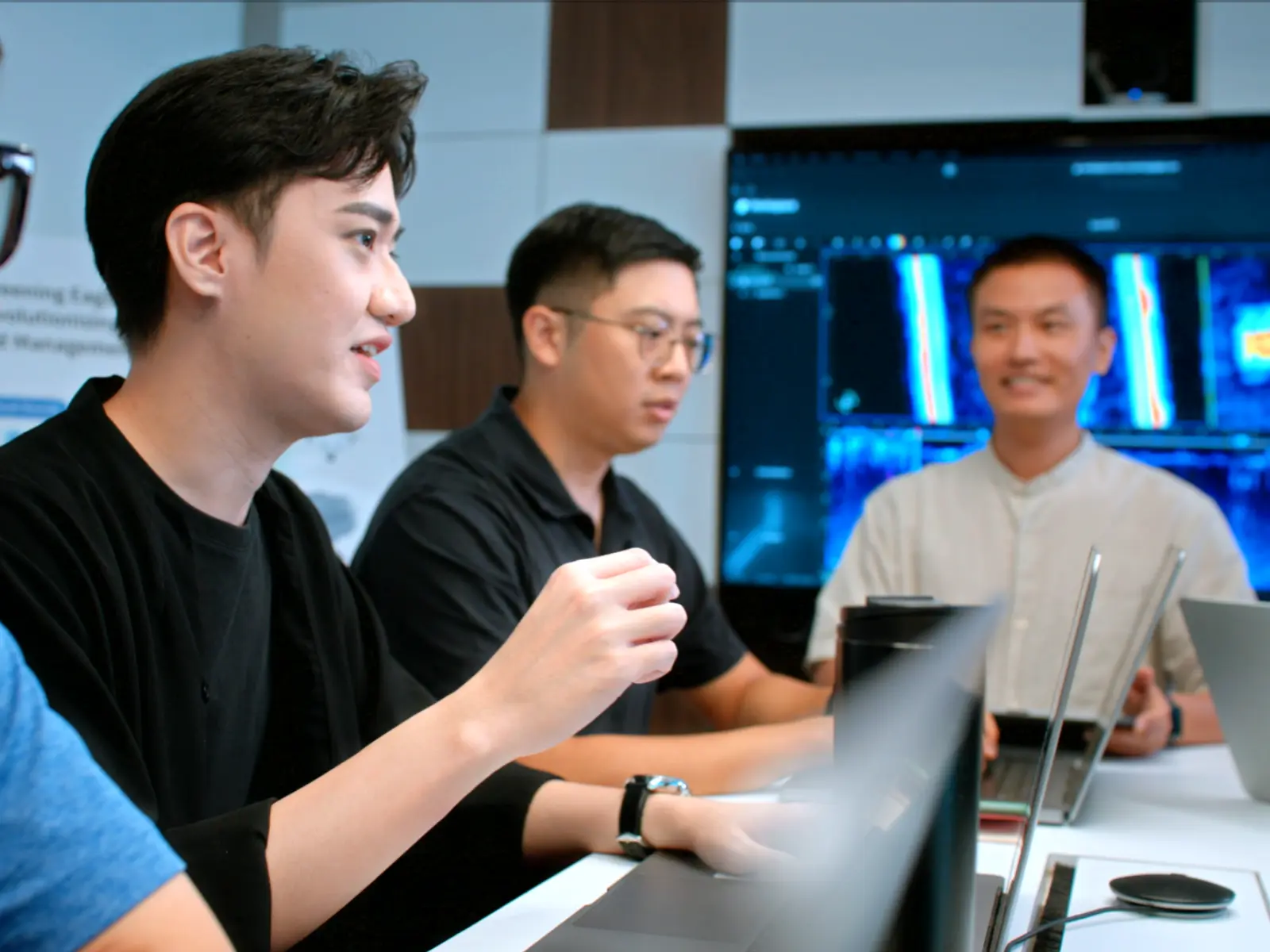Imagine using advanced sensors and the power of artificial intelligence to predict and prevent structural faults in buildings and bridges before they happen. Doing so goes a long way toward safety, and this is exactly what two DigiPen (Singapore) alumni — Julian Teh and Toh Kai Liang — are helping to achieve at Screening Eagle Technologies, where they are both part of the research and development (R&D) team.
Screening Eagle Technologies, a global leader in intelligent inspection solutions, offers software and sensor technology for the construction and built environment sectors. The business is focused on analyzing built assets and infrastructure such as buildings, roads, and bridges. Over time, these structures can be damaged or suffer wear and tear without anyone noticing. These unnoticed issues can lead to dangerous situations. Hence, Screening Eagle develops sensors and software to detect, manage, and analyze such issues, ultimately helping clients make informed decisions about their assets and infrastructure.
Julian Teh, a 2015 BS in Computer Science in Real-Time Interactive Simulation graduate, is currently the deputy lead of R&D at Screening Eagle. Julian begins his day by staying updated on the latest tech developments before diving into coding or various meetings. Most recently, he has been working with other teams to develop and launch a technology preview platform that will allow Screening Eagle to share new or experimental features with customers ahead of full development. “This lets us get early feedback from customers and involve them in the development process much better than through conversations alone,” Julian explains.
Working alongside Julian is 2022 BS in Computer Science and Game Design graduate Toh Kai Liang. For Kai Liang, a typical workday involves prototyping new features and visualizing complex scan data collected from Screening Eagle’s devices. He also helps to fix bugs for any 3D-related components on their existing apps. “I am currently prototyping an app that lets us visualize scan data that we have gathered from our in-house devices,” Kai Liang says. He adds that the focus on this prototype is to present large, multi-layered data in a way that is easy to interpret for customers, so that they can see how the data fits within the real-world environment.

As key members of the R&D team, Julian and Kai Liang are part of a mission to safeguard the built environment by using cutting-edge technology to ensure that structures like buildings, roads, and bridges remain safe and functional.
Both Julian and Kai Liang were drawn to Screening Eagle because they wanted a chance to work in an environment that values creativity. The R&D department was a perfect fit for that. Julian appreciates that Screening Eagle is a lean company with a strong product and innovation focus, which allows staff to experiment with new technology, iterate very quickly, and transform ideas into valuable tools for customers. Kai Liang shares a similar passion for R&D. “The thing I enjoy most about working here is the wide exposure I get, whether it’s through discussions with my colleagues or the prototypes we develop. There are always new ways to approach problems, and that keeps the work fresh and interesting,” he says.
Their drive to learn and innovate has not gone unnoticed. Steven Zhang, an engineering manager at Screening Eagle who co-leads the R&D team with Julian, points out a few key traits that make DigiPen graduates stand out: “They’re awesome thinkers and problem solvers, capable of coming up with great ideas and bringing them to fruition,” he says. “What’s more, they’re equipped with a lot of 3D graphics knowledge and experience, which is something unique from DigiPen.”
This resilience and adaptability have proven crucial for the graduates when faced with challenges at work. Kai Liang explains that things move rapidly while in R&D development. It is thus necessary to balance the time needed to learn new technologies while implementing them efficiently. Fortunately, their time at DigiPen (Singapore) has prepared them well for this.
“DigiPen instilled in me a unique perspective of creative problem solving through the indie game development projects and the raw, technical rigor of C/C++ programming every trimester,” Julian says. “This allows me to bring an innovative, can-do mindset to tackle challenges at work — as well as the technical foundation to pick up any new technology required.” Kai Liang agrees, saying he’s especially thankful for the robust foundation of deep software development skills that he learned during his time in school.
Both Julian and Kai Liang are excited about the future and look forward to continuing their journey of learning and innovation at Screening Eagle. To anyone looking to enter the world of R&D, they advise keeping an open mind and being flexible with initial ideas. “As you work and discover new things, it is helpful to take a step back and reassess. With the new insights, better solutions that might be worth exploring often pop up,” Kai Liang says.
